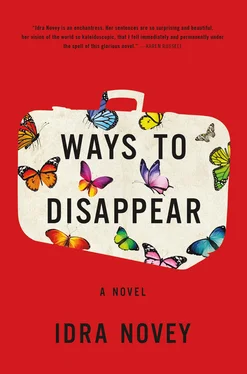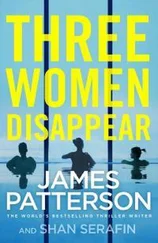
Miles remained. Emma hadn’t had the nerve to kick him out of her room but she hadn’t ceded either. The only meal they ate together was breakfast. After that, she left for the hospital and Miles swam endless laps in the hotel pool or took runs when it was still hot enough to sear the skin on his forehead and the tips of his large ears. When Emma brought up the benefits of a hat to him at breakfast, how she’d resisted the idea as well, Miles turned away to scowl at their waiter. He said he could see the man in the doorway doing nothing but staring out at the ocean. This must be why you feel so at home here, he said. Nobody seems to care who might be waiting for them.
Emma responded with a tense smile. It seemed as awkward a time as any to let him know that Marcus was going to be released soon from the hospital. At the news, Miles began chopping at various invisible objects on the table with his butter knife. You can’t go on pretending this is your life, he said.
It’s been my life for years.
Chop, chop, chop went his knife against the table. A child came by selling flowers made of lacquered shells, and then their waiter crept up to say there would be no espresso today, unfortunately. Something was wrong with the machine. Could he offer them some tea?

The water around the island of Boipeba hid nothing. As the catamaran slowed and docked, Raquel could see clear to the bottom, all the broken shells spiraling in the wake of the boat, even the tiny fish glinting among the reeds. Up on the bank, everything was a blur of tourism. She tried to focus on the hotels and their umbrellas but was distracted by all the donkeys and foreigners, the islanders hustling back and forth, trying to make a buck.
Senhora, a bagagem! a man loading up one of the donkeys shouted, pointing at the waste his animal had just left and through which she’d just wheeled her luggage.

All week, João had been watching the heavy older woman with the trench coat. It hadn’t rained a single day on Boipeba but the woman kept the coat with her at all times, like a purse or a pet. When she first walked into the hotel, he’d assumed with her pale skin and light eyes that she must be a foreigner. But she spoke perfect Carioca Portuguese and didn’t ask about air-conditioning or Wi-Fi or any of the things the foreigners wanted to know. She’d just asked for the weekly rate, lit a long Dannemann cigar as if it was the most obvious thing for a heavyset older woman holding a trench coat to do on a remote island, and followed him so quietly to the room that he wouldn’t have known she was still behind him if it wasn’t for the leafy aroma of her lit cigar.
Every day since then, she had smoked through the afternoons. She’d pick a spot out under the umbrellas or at one of the shaded wooden tables under the palms. Ana, who made up the rooms in the mornings, was the one who first started calling her the Widow Yolanda and said the cigars must have belonged to her husband. João had never seen a woman smoke a cigar in public like that, but then his mother had done strange things after the fishing boat came back without his father. There had been the baths in the middle of the night and, as with the Widow Yolanda, hours when all his mother could do was stare at the trash can or a crack in the wall as if it were as hypnotizing as the waves.
Mario, the owner, who had been to Rio many times, said he could tell that the widow had been a looker once. He said it was a shame she’d let herself get so round and morose. He said Cariocas were known for staying sexy into their fifties, and with her green eyes and reddish-gray hair, Yolanda would have found a second husband, no problem, if she’d kept herself together.
On the island, however, the Widow Yolanda was most definitely falling apart. Every morning she looked more broken. Her second day on the island she left her lunch uneaten. Her third day she sat on her glasses and cracked one of the lenses. She’d asked João for some tape to hold the frames together enough to wear, though she admitted that she could barely see through the lenses now at all.
When a young woman walked in during breakfast on Friday morning and said Mamãe and ran to the widow, all the guests eating at the other tables turned to watch.
At the daughter’s touch, a twitch rippled through the widow as if she were a just-slit eel. João knew he should look away but he couldn’t. No one did. The daughter touched her mother’s crooked glasses and the filthy trench coat and started sobbing. Next to the daughter, who was not beautiful, he saw what Mario had been talking about. It wasn’t just that the daughter didn’t have her mother’s green eyes or long, slender, foreign-looking nose. When the widow moved, it felt historic. It was like watching an aging leopard slink through a forest. They’d all been mesmerized, trying to imagine how effortlessly she must have hunted once.
And then the Widow Yolanda abruptly let her daughter go and stepped backward — leaving her daughter’s arms out in the air around nothing, in front of everyone. The daughter turned her face as if she’d been struck, and João turned away as well, ashamed for her. There was also, suddenly, a strong smell of fresh dung.
When he looked back, the daughter was stepping out of the breakfast area, the widow behind her. The rest of the day the two of them kept their distance from the hotel. He saw them once on the beach, the widow puffing on one of her long Dannemann cigars, the sleeves of her coat rolled up over her freckled wrists, and the daughter talking, always talking. The next two mornings at breakfast they sat at the farthest table. João couldn’t hear what they were saying, though it was the daughter who kept gesturing, squeezing her hands into fists. The Widow Yolanda remained still as a leopard, smoking, listening.
That afternoon, as abruptly as the daughter had appeared, she wheeled her luggage back down to the dock. The widow followed slowly behind her, holding nothing but the coat. They hadn’t handed in the key or paid for the last two nights. João knew it was his job to run after a guest in such a situation. It was so awkward. He hated it and couldn’t bring himself to do it now, not to the widow and her homely daughter. If Mario gave him a hard time he could just say he didn’t see them leave, that they had been sneaky. Mario had said the widow was a Jew.
But Yolanda didn’t go. When the boat left, only the daughter was on it. The widow stayed on the dock, watching, the donkeys moving slowly around her. She was still there after the arriving passengers had gone and after the boatmen had left for lunch, the sun beating down on her round, sad shape, and João wondered if he should guide her into the shade, if someone should, but no one did. She wasn’t that kind of woman.

To stand on a dock among packs of donkeys and watch your daughter float across the water, away from you.
To watch her through broken, splintered glasses.
To have stayed awake for two nights watching your grown child sleep, a child who you’d forced too early to be an adult and who’d grown thick from it the way a vine will.
To study the woman this child has become as she sleeps heavily next to you.
To drink her in and in, like a stew for which there is no spoon.
To see enough through the fractured glass in your lens to know even in her sleep she is uneasy with you now, abhors the heavy coat you found on a bench which is hideous but you can’t let go of it for its pockets.
Читать дальше













